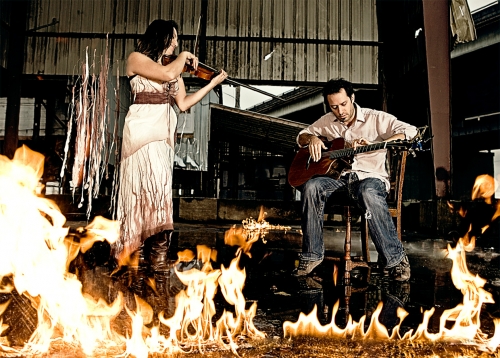
Getting a touring musician on the cell phone for a few minutes isn’t exactly rocket science these days, unless their GPS has taken a dive rolling through Sasquatch country or the van has blown a sidewall in a granite-lined mountain pass tunnel someplace, but it seemed like a flourish of cosmic improbability that we cornered Trace Bundy a few weeks ago, not only in his home ZIP code but actually on his way back from the studio — maybe the one place Bundy actually spends less time in than his own house.
There were plenty of other places we could have caught Bundy this past year:
Budapest, Paris, London, Montreal, Nashville.
Greybull, Wyo. Wait … where? “Well,” he laughed, “one my goals is to play [at least one gig] in every state.
And, y’know, there’s not a lot of opportunity to play in Wyoming. Somehow, these private promoters in this tiny, tiny town of Greybull got really excited by my music and spreading it around town, and started saying, ‘I wonder what it would take to get this guy to come up here.’ They had this little municipal airport nearby, and I just thought, ‘It would be kind of cool to go up there and do a show.’ So I did. It was fun.”
What’s taken Bundy through the great cities and dusty outposts of civilization is the genre-bending alchemy of his solo acoustic guitar gig, an international extension of the rapturously received capo-slinging, fretboard-tapping, soundhole-mugging live shows he used to play around Boulder and Fort Collins.
Bundy is a former doctoral student and engineering professor from CU, and his approach to the instrument is unsurprisingly tactile. More or less a standard fingerstylist until the early part of the last decade, Bundy happened across a few tapping figures messing around in his living room one evening and decided on a lark to tear off a number built on that technique called “Dueling Ninjas” for an encore one night.
Shortly thereafter, clips from his 2004 Boulder Theater DVD Adapt started appearing on YouTube, and Bundy became an Internet sensation, initially with his lithe and touching read of Pachelbel’s iconic Canon in D, and most notably in Taiwan and South Korea, where legions of flummoxed teenagers, certainly unaware that players like Pierre Bensusan and Michael Hedges had exploited some of these techniques a generation earlier (Bundy himself hadn’t heard of either until he was already deeply invested in his own career), went absolutely berserk, getting Bundy fired from his homepage Internet provider, a post-millennial equivalent to shelving general admission arena seating out of fear of fan-crushing, seat-grabbing riots.
One may speculate whether Bundy’s wider world reputation would have sloped so radically had his audience merely heard these pieces — genuine guitar aficionados can immediately hear Bundy’s true gift for deeply nurtured musicality — but it all does present Bundy with a challenge. The knocks, the accidental overtones, the sheer joy of spontaneous harmonic consonance — isn’t getting this all down on tape a matter of choosing what to leave in and what to scrub away into oblivion?
“Yes,” Bundy agrees. “That’s exactly it.”
“Playing these tunes live, there is always a little bit of room for that bad note here and there. But recording them, capturing the song near perfectly — like when you’re moving the capo around and the guitar goes a little bit out of tune — it’s so hard to capture that on a two-dimensional disc.
“Like, the noise a capo makes when you move it a couple of frets down. Some of that stuff is great, but when you’re moving it up it moves the strings around and makes everything a little bit sharp, and you don’t really want that. So I have to be really creative — I’ll record one part of the song, then move the capo and record another part.
“But I have some tricks I use. I wear basically a sock over my forearm, so when it’s rubbing against the guitar it’s a little bit quieter. I put baby powder on my hands when I’m doing percussion on the guitar, or else you hear this kind of [nearly inaudible] noise. Just little stuff like that.”
Bundy concedes a bit of studio truancy, with no new material since 2008’s The Missile Bell, but promises a new CD in the early spring.
“I do drag my feet a little when it comes to the studio,” he says. “But the stuff I write is really hard to play, and getting it just right takes a lot of work.”
And with that, Bundy signed off to start packing for his upcoming tour.
In Singapore.
Respond: [email protected]














